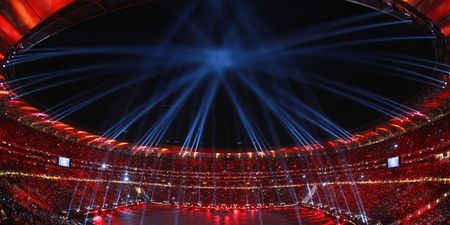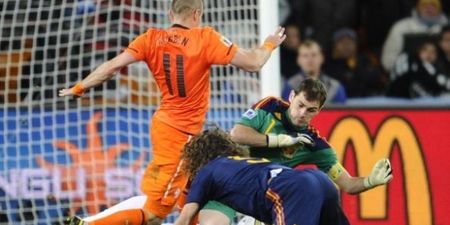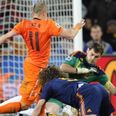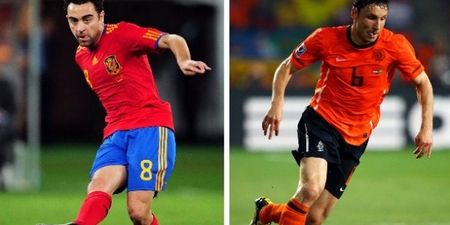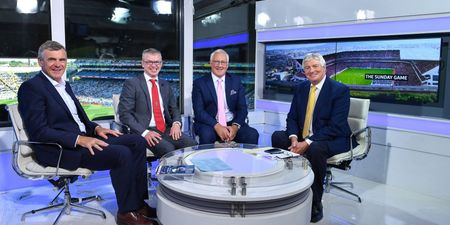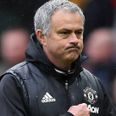
England v Germany is not just another football match, it’s the definitive England World Cup match – and England should win, writes Ken Early.
Â
“The shackles were off!†“What?†“You played with freedom!†“Yes!â€
With these answers to Gabby Logan, Fabio Capello suggested he has yet to master English football’s vocabulary of inhibition, with its overtones of S&M and the Man in the Iron Mask. Or maybe he was trying too hard to remember his lines to listen to what Logan was saying. Capello’s remarks bore little relation to the match everyone had just seen. He was talking about an England team that had played to its potential and showed its champion spirit. In fact the best thing about England’s display in Port Elizabeth was a subtitled video of Capello’s antics during the match that showed the extent of his frustration (and gave an insight into the dynamics of his relationship with Stuart Pearce).
Steven Gerrard said England showed “passion, fight, team spirit, togetherness, and quality too†– presumably in descending order of importance. The first four items on the list are a minimum expectation for any decent World Cup side and as for the last, England didn’t show much. Slovenia, a modest team even on their best days, had been overwhelmed by the occasion – unless they were deliberately attempting to break a World Cup record for the most free kicks lobbed gently into the hands of the opposing goalkeeper. Still England had been able to score just one goal, and that a gift from the Slovenian keeper who had revealed against the United States that he was incapable of saving anything directed at his face. Their failure to punish Slovenia with more goals means England will probably have to beat Germany, Argentina, Spain and Brazil to win the tournament.
First up is Germany in Bloemfontein – described by David James yesterday as “another football matchâ€. The lameness of that assertion became obvious as reporters quizzed him for several minutes on penalty shootouts, with questions that started sensibly “Have you been practising penaltiesâ€; became less so: “Do you have the mental strength to handle that situation?â€; and ended very silly “How many penalties out of five should you save?†England v Germany is not another football match, it’s the definitive England World Cup match, and what happens on Sunday will define the England careers of several players including James himself.
According to Franz Beckenbauer, that makes England dangerous. His logic is that Germany have one of the youngest sides in South Africa but most of this England team won’t play in another World Cup: the desperation not to waste their last chance will give them an edge. But maybe the England players don’t look at it as the Kaiser would. Asked to explain why Germany are so much more sucessful than England in tournaments, Jurgen Klinsmann told the BBC, “We’re not afraid of big moments. We enjoy them.†Now listen to Steven Gerrard exulting in England’s victory against the Slovenes: “When our backs are against the wall and people out there are doubting us, we’ve rolled up our sleeves and produced the goods.â€
Gerrard seemed to be saying that England draw strength from a siege mentality but it’s important to remember that sieges are not much fun. Much is made of Alex Ferguson’s use of the “everyone’s against us†motivational trope but the last thing he tells his players before the match is “enjoy yourselvesâ€. England seem to be trapped in a permanent state of siege, raging against the forces ranged against them while they teeter on the brink of destruction, sinking into depression as they brood on the price of failure. They never enjoy themselves.
The exceptions prove the rule: sometimes an England player comes along who, for whatever reason, is immune to the mood of dread and foreboding – Gascoigne in 1990, Owen in 1998, Rooney in 2004. Owen and Rooney were both 18, uninitiated into the cult of fear; Gascoigne was older at 23 but he was too crazy to be frightened. These players saw no reason why they shouldn’t attempt extraordinary things and they led England to their most memorable tournament performances, but with Rooney subdued and goalless since March, there’s nobody in the squad now who seems likely to do the same.
But the World Cup need not be a complete write-off for England. This time, as in Euro 2000, they should at least beat Germany. A cruel series of pre-tournament injuries reduced Germany coach Jogi Loew’s central midfield reserves to zero, and now Bastian Schweinsteiger is struggling with a muscle problem. Schweinsteiger will almost certainly play but that doesn’t mean he’s fit.
Germany’s style of play – modelled according to Klinsmann and Loew on the high-tempo football of the Premier League – aims to get the ball to the strikers as quickly as possible while keeping it on the ground, but the price of their relentless attacking is that they give away possession more cheaply than the classic German sides did. That will suit England, who lack a clever ball-winner in the mould of Javier Mascherano. Mesut Ozil is the most creative player on either team and Germany have the pace to test England’s slow defenders, but Lukas Podolski is flaky, Miroslav Klose is out of form and Cacau, the naturalised Brazilian who started up front against Ghana, is injured.
As Marc van Bommel said after Holland beat Denmark, this Germany is less like the cynical and resilient German teams of the past and more like an old-fashioned Holland: quick, stylish and comparatively lightweight. England are more than a match for them, and winning on Sunday holds the promise of redemption for a generation of English players, a moment of glory the critics and doubters can never take from them. Gerrard can then lead his team to Cape Town where they can lose to Argentina with dignity.




